Coordinación
Una coordinación sólida puede evitar vacíos y duplicaciones en las respuestas humanitarias, así como garantizar que los PTM complementen otros tipos de asistencia. Sin embargo, el informe del «Estado Global de los Programas de Transferencias Monetarias» de la CALP Network muestra que la coordinación de la asistencia en efectivo es vista como débil y ad hoc, y que esto está teniendo graves repercusiones operativas.
Los donantes, las ONG y los líderes de los grupos de trabajo de transferencias monetarias (GTM) han pedido claridad sobre tres temas principales relacionados con la coordinación de la asistencia en efectivo:
- Quién debe ser responsable de asegurar una coordinación eficaz de la asistencia en efectivo;
- Cuál es la función y el mandato de los grupos de trabajo de transferencias monetarias, incluso en relación con las transferencias monetarias multipropósito;
- Cómo se debe dotar de recursos a la coordinación de asistencia en efectivo.
Tenemos que basarnos urgentemente en lo que funciona y proporcionar claridad a nivel mundial sobre las preguntas arriba mencionadas, adaptándonos a los diferentes contextos. Hace mucho tiempo que se deberían haber tomado decisiones claras basadas en necesidades operativas y no en la política de las agencias.
Prioridades actuales
El objetivo de la CALP Network es contribuir a seguir progresando en este tema en tres niveles: apoyar a los grupos de trabajo de transferencias monetarias a nivel regional; contribuir a soluciones prácticas para la coordinación de la asistencia en efectivo a nivel mundial; y convocar una discusión basada en la evidencia sobre temas clave, destacando puntos de decisión críticos y oportunidades de progreso.
Contenido destacado

Cash Coordination Tip Sheet
Guidelines and Tools
This tip sheet sets out established best practice, key guidance and resources for all aspects of cash coordination, intended as a clear, accessible and action-oriented guide for those engaged in coordination of cash and voucher assistance (CVA) at the field level.

Introducing the Cash Coordination Tip Sheet
Webinar
The CALP Network has developed a tipsheet setting out established best practice and key guidance and resources for all aspects of cash coordination, intended as a clear, accessible and action-oriented guide for those engaged in coordination of cash and voucher assistance at the field level.

Cash Coordination: A proposal from members in MENA
Blog Post
Earlier this year the CALP Network undertook regional consultations to explore options for cash coordination. This blog lays out recommendations from participants from the Middle East and North Africa who sketched out what cash coordination, and coordination more broadly, could look like in future to support a more effective, efficient and accountable response.
Últimos recursos
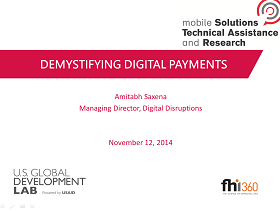
Demystifying Payments – mStar
Report
In its simplest form, a payment is any exchange of value between two parties, where usually Party A offers a form of currency in exchange for a good or service provided by Party B. The advent of nation-states issuing fiat currency, such as paper bills and bronze coins, which unlike gold or silver...
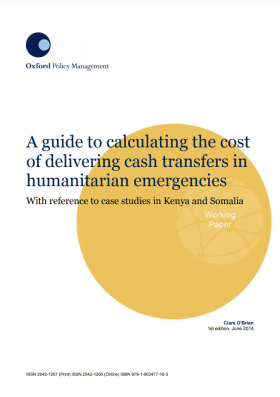
A Guide to Calculating the Cost of Delivering Cash Transfers in Humanitarian Emergencies – With reference to case studies in Kenya and Somalia
Report
The emergence of cash transfers as a viable alternative to in-kind aid – such as food or shelter materials – for households affected by humanitarian disasters has been documented for some years now. Under certain conditions, when local markets are able to accommodate increased demand and prices will...

Testing Branchless Banking to Deliver Cash Transfers in Nepal
Policy paper
The Human Development Social Protection Pilot (HDSPP) is a sub-project of the joint UNDP-UNCDF Local Governance and Community Development Program (LGCDP). It has been initiated in two far-western districts in Nepal, Kanchanpur and Dhadheldura and it is being implemented by the Ministry of Federal Affairs...
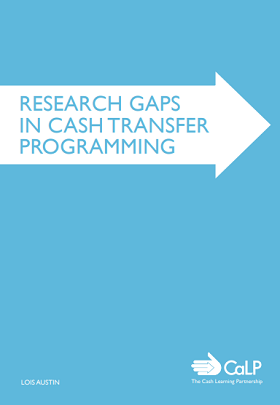
Research gaps in cash transfer programming
Report
Gathering evidence through action research is one of the ways that the CALP Network aims to improve cash transfer programming (CTP) implementation and raise awareness about CTP and its use as an appropriate and effective mechanism for emergency response. Before defining potential research topics for 2014,...

Understanding the Interaction Between Women’s Economic Empowerment and Gender Based Violence: Study on ACF’s cash transfer programme in northern Uganda
Report
This paper presents findings of a qualitative study conducted in Northern Uganda, on the effects of a cash transfer programme on gender relations and GBV in a post – conflict context. The intervention in focus is Action Against Hunger |ACF International (ACF)’s ‘Combating Gender Based Violence and...
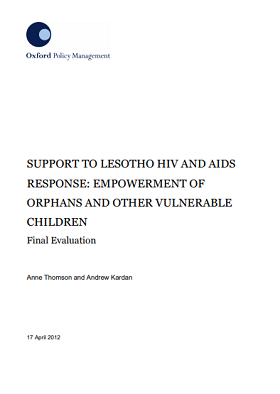
Support to Lesotho HIV and AIDs Response: Empowerment of Orphans and Other Vulnerable Children
Report
Oxford Policy Management (OPM) has been contracted by UNICEF Lesotho to undertake the final evaluation of the Project “Support to Lesotho HIV and AIDS Response: Empowerment of Orphans and Vulnerable Children”. The main objective of this evaluation is to provide decision makers in the Government of...

Scoping study – Emergency cash transfer programming in the WaSH and shelter sectors
Report
Over the past few years, the dialogue on cash transfer programming has progressed beyond initial debates about whether distributing cash and vouchers is a valid response modality at all to a general acceptance of their added value in appropriate contexts. Beyond the livelihoods and food...
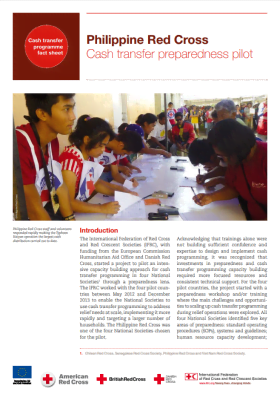
Cash Transfer Preparedness Pilot – A Cash Transfer Programme Fact Sheet
Policy paper
The International Federation of Red Cross and Red Crescent Societies (IFRC), started a project to pilot an intensive capacity building approach for cash transfer programming in four National Societies through a preparedness lens. The IFRC worked with the four pilot countries between May 2012 and...

Refugee Economies: Rethinking popular assumptions
Report
‘Refugee economies’ remain under-researched and poorly understood and there is a lack of good data available on the economic lives of displaced populations. Existing economic work on refugees tends to focus narrowly on refugee livelihoods or on the impact on host states. Yet, understanding these...

Market Analysis for Preparedness: The urban informal settlements of Nairobi
Report
The last few years have seen a significant change in the way humanitarian organisations approach response design. Partly spurred on by the growth in cash transfer programming and market-based programming, the practice of working through and supporting local markets is now widely considered best practice...
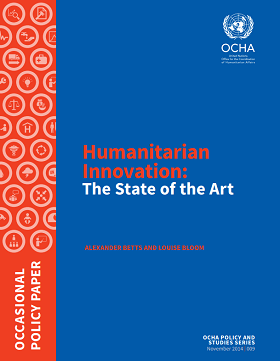
Humanitarian Innovation: The State of the Art
Policy paper
The humanitarian system faces grave challenges, as record numbers of people are displaced for longer periods by natural disasters and escalating conflicts. At the same time new technologies, partners, and concepts allow humanitarian actors to understand and address problems quickly and effectively....
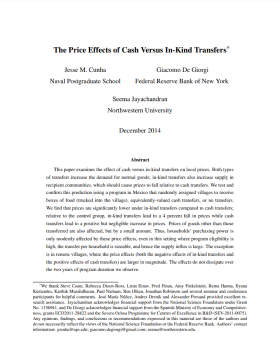
The Price Effects of Cash Versus In-Kind Transfers
Report
This paper examines the effect of cash versus in-kind transfers on local prices. Both types of transfers increase the demand for normal goods; in-kind transfers also increase supply in recipient communities, which should cause prices to fall relative to cash transfers. We test and confirm this prediction...

Is Cash Transfer Programming ‘Fit for the Future’? – Executive Summary
Report
This summary presents the results of a 2013 research study entitled, Is Cash Transfer Programming ‘Fit for the Future’? The research was commissioned by the the CALP Network and undertaken by the Humanitarian Futures Programme (HFP), King’s College London. The project intends to understand...

Cash-Based Assistance Programmes for Internally Displaced Persons in the Kabul Informal Settlements
Report
To improve aid delivery and effectiveness, Welthungerhilfe (WHH) piloted during the 2013/2014 winter a mobile-based cash assistance programme aimed at supporting IDP families living in the Kabul informal settlements (KIS) using Roshan’s M-PAISA service. To assess the strengths and...
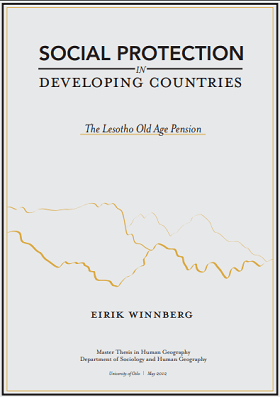
Social protection in developing countries – The Lesotho Old Age Pension (MSc Thesis)
Report
By using the example of the noncontributory pension scheme in Lesotho, the author explores the process of implementing social protection in developing countries, looking at how constraints can be overcome and what consequences can be found. This paper also looks at the justification for directing such...

Cash-for-shelter pilot findings in CRS’s Typhoon Haiyan Response
Report
In order to explore possible strategies for shelter assistance that would also benefit local markets, a cash transfer pilot study was conducted in which beneficiaries received cash to purchase shelter materials and to hire labourers. CRS promoted disaster-resilient construction techniques and employed a...
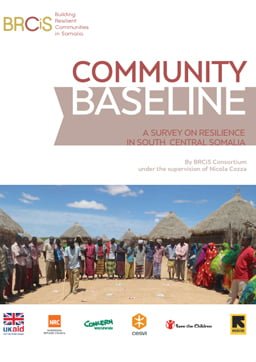
Community Baseline: A Survey On Resilience In South Central Somalia
Report
A comprehensive understanding of the socio-economic and environmental context of intervention is essential to the success of any resilience-building program. Based on this premise, the BRCiS has taken a series of steps to strengthen its knowledge and understanding of key variables and dynamics in its...

Payment Mechanisms and Anti-Poverty Programs: Evidence from a Mobile Money Cash Transfer Experiment in Niger
Report
Cash transfers have become an increasingly important component of social protection policies in both developed and developing countries. While such programs are often implemented electronically in developed countries, in many developing countries with weak financial infrastructure, such transfers are...

Does one size fit all? The Conditions for Conditionality in Cash Transfers
Presentation
Created in the early 1990s in Latin America, Conditional Cash Transfer programmes (CCTs) are now at the forefront of the international policy debate as one of the most effective social interventions for tackling poverty in developing countries. However, if CCTs have been successful in achieving some of...
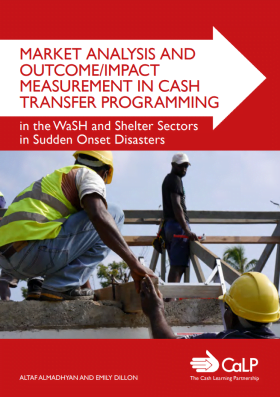
Economic Impact Study: Direct and Indirect Effects of the WFP Value-Based Food Voucher Programme in Lebanon
Report
This study examines the direct and indirect impacts of WFP’s e-card programme on the Lebanese economy. It is part of a broader United Nations initiative to assess the economic impacts of humanitarian assistance in Lebanon. The e-card programme is an important element of the international humanitarian...